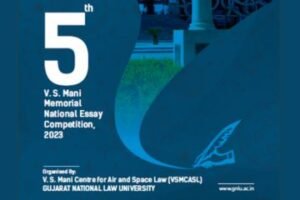CBLT – National Conference on Direct Tax Laws
National Conference on Direct Tax Laws in collaboration with Shardul Amarchand Mangaldas & Co. scheduled to be held in the last week of March 2025 (tentatively). This event is being conducted to provide an in-depth understanding of Direct Tax and International Tax laws, along with their practical applications.
About the RGNUL, Punjab
The Rajiv Gandhi National University of Law (RGNUL), Punjab, was established by the State Legislature of Punjab. The Act incorporated a University of Law of national stature in Punjab to fulfill the need for a Centre of Excellence in legal education in the modern era of globalization and liberalization. Recently, the University has earned the coveted status of being one of the top-ranking law teaching institutions in the Country. Over 1000 students acquire state-of-the-art legal education in a well-furnished and fully developed residential campus which boasts of all necessary infrastructural and manpower facilities for the all-around growth of the students. RGNUL is currently emphasizing research, training, and consultancy in various areas of contemporary interest. It is envisaged to be a research-intensive university in the times to come.
About the Centre for Business Laws & Taxation (CBLT)
The Centre for Business Laws and Taxation (CBLT) is one of the Rajiv Gandhi National University of Law, Punjab’s flagship centres. The Centre aims to further its objective of bridging the gap between the theory and practice of corporate law. It is established to promote comparative research and discussion in corporate law. It focuses on analyzing current policy approaches in various areas of corporate laws such as corporate governance, insolvency law, mergers and acquisitions, taxation, etc. It plans to streamline the process of learning through academic courses, programs, and publications. It also focuses on identifying the gaps between industry and academia through effective joint research. The Centre follows a multi-disciplinary approach to recognizing problems in the field of corporate laws and endeavours to engage in dialogue to facilitate changes in it. It is based on establishing a culture of discussion on corporate laws in the country by educating the next generation of lawyers and law students.
About the Conference
The National conference envisages providing its participants with a comprehensive understanding of Direct Tax Laws and related recent developments in India and around the globe. The conference aims to boost research-based investigations into contemporary issues relating to direct tax laws. Through the conference, the participants will gain practical knowledge and skills regarding pertinent issues in relation to litigation, advisory and compliance associated with direct tax. The conference will not only promote professional practices relevant to legal academia and legal practice. The proposed topics of the conference will cover the basics of direct tax laws, contemporary issues and the intersection of direct tax laws with IPR, big data, corporate restructuring, IBC etc. The national conference will comprise a panel discussion that will involve practitioners and academicians and paper presentations.
Sub-Themes of the Conference
- The Evolution of Corporate Tax Structures in the Digital Age
- The Use of AI and Big Data in Tax Enforcement.
- Challenges in Taxing the Gig Economy Workers and Platforms.
- Pillar One of Base Erosion and Profit-Sharing Model Rules
- Evolution and Implementation of Minimum Alternate Tax (MAT).
- The Interplay Between Taxation and Environmental Policies.
- Tax Implications of Cross-Border Mergers & Acquisitions.
- Tax Residency and Permanent Establishment Concepts.
- Transfer Pricing Documentation and Compliance: International Best Practices.
- Tax Risk Management and Internal Control Systems.
- The Digital Services Tax and its Global Implications.
- The New Direct Tax Code: Boon or Bane.
- The Challenges in Interpretation and Implementation of Double
- Tax Avoidance Agreements: A Judicial Perspective.
- Analysing the Effectiveness of Country-by-Country Reporting (CbCR) Mandate.
- Angel Tax and the Indian Startup Economy.
Important Dates
Abstract Submission – February 28, 2025
Final Paper Submission – March 15, 2025
Conference Date – Last Week of March (tentative)
Registration Details
Registration Fee – INR 1000/- + GST for Advocates, Academicians and other Practitioners
Registration Fee – INR 750/- + GST for Students and Research Scholars.
(Rs. 500 extra in case of a co-author.)
*Note: Payment link will be circulated after acceptance of abstracts.
Submission Guidelines
- The research papers should pertain to any of the sub-themes of the conference.
- Participants shall be required to submit an abstract of around 350 words.
- The abstract shall also contain, the name of the author/authors, email ID of the author/s contact number and designation. Acceptance of abstracts shall be communicated separately.
- The payment link shall be shared separately if the abstract is selected.
- The full paper shall not exceed 6000 words. It shall be typed in Times New Roman, Font Size 12 on A4 size paper on any of the sub-themes of the conference with a 1″ margin on all edges with 1.5 line spacing using MS Word.’
- Abstracts shall be required to be submitted via this Google form link – https://forms.gle/RVRAZicMmz1WXbjo8
- The citation shall be strictly per Bluebook 20th Edition.
- The university may publish selected papers. The selection of papers for publication shall be at the university’s exclusive discretion.
For any queries, please feel free to contact the undersigned –
Ms. Abha Singhal
(+91) 9602908908
Mr. Tanmay Doneria
(+91) 9997730505




